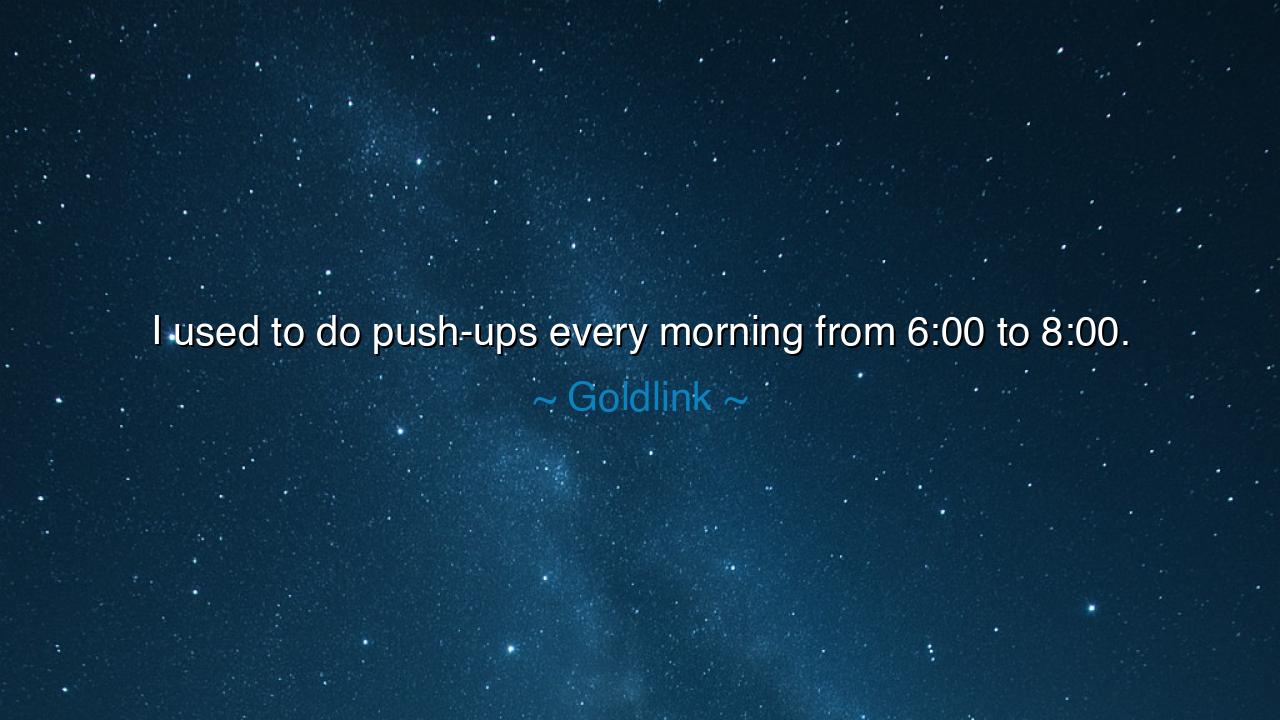
I used to do push-ups every morning from 6:00 to 8:00.






The words of Goldlink, “I used to do push-ups every morning from 6:00 to 8:00,” resound with the discipline of ritual and the hunger for strength. Though simple in form, the push-up becomes here a symbol, not merely of physical exercise, but of devotion to growth, to order, to the shaping of self. To commit two full hours of each dawn to a single act is no idle pastime—it is an offering, a declaration that each day will begin with effort, with sweat, with the conquering of the body before facing the trials of the world.
The origin of such a practice lies in the eternal wisdom that morning shapes the destiny of the day. To rise at six, when others still sleep, and to labor until eight, is to claim mastery over the hours. In this, Goldlink joins a lineage of warriors, monks, and seekers who began each day with ritual discipline. The act itself—push-ups—may seem humble, yet the repetition, the endurance, the constancy transforms it into something greater than muscle alone: it becomes the training of will. For in every push against the floor lies the deeper push against weakness, sloth, and despair.
History teaches us the same truth. The samurai of Japan began their mornings with practice of sword and spirit, long before they ever rode into battle. Benjamin Franklin rose with the dawn, not for leisure, but to order his mind and body through study and exercise, laying the foundation of his day before the world stirred. And the Spartan youth, trained from childhood, performed daily drills that hardened them for the trials of war. In each of these, as in Goldlink’s discipline, the dawn became the forge where strength was hammered into being.
Consider also the story of Muhammad Ali, who famously rose early to run, train, and sweat while his rivals still slept. He once said, “I hated every minute of training, but I said, ‘Don’t quit. Suffer now and live the rest of your life as a champion.’” Like Ali, Goldlink’s ritual shows that greatness is not born in moments of glory, but in the unseen hours of repetition, when no one watches, and the body is broken down only to rise stronger.
The lesson here is this: greatness is hidden in consistency. One push-up means little. Ten may pass unnoticed. But thousands, repeated day after day, carve new strength into the body and new resilience into the spirit. So too in life: one act of discipline seems small, but repeated faithfully, it transforms the whole of a person’s being. The morning becomes the crucible where we either squander our strength or multiply it.
Practically, this calls us to establish our own rituals of discipline. Rise earlier than you think you can. Begin each day with a practice that challenges you—whether it is exercise, study, meditation, or creation. Do it not for applause, but for mastery. The body may resist, the mind may complain, but with repetition, both will yield. Over time, what was once effort becomes strength, and what was once routine becomes the foundation of power.
So, beloved listener, take Goldlink’s words as a summons: build your mornings with discipline, and your life will be built with strength. Do not despise the simple act, for in its repetition lies transformation. Whether push-ups or another practice, let your mornings be filled with purpose. For the one who conquers the dawn conquers the day, and the one who conquers the day may in time conquer the world.






AAdministratorAdministrator
Welcome, honored guests. Please leave a comment, we will respond soon